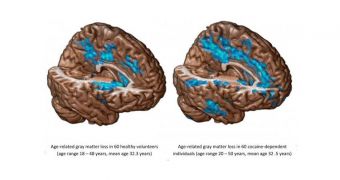According to the conclusions of a new scientific investigation conducted by experts at the University of Cambridge, it would appear that chronic cocaine users experience an accelerated rate of brain aging.
The scientists say that this component of the human aging process, which occurs naturally, takes place a lot faster in chronic cocaine users and addicts. Details of the research were published in the April 24 issue of the esteemed medical journal Molecular Psychiatry.
Experts focused their attention on age-related loss of gray matter, and found this rate to be significantly higher in addicts than in those who did not use the heavy drug. Some 120 test participants, of similar age, gender and verbal IQ, were analyzed for this study.
Of the test subjects, 60 were addicted to cocaine, whereas the other 60 did not consume drugs. The investigation determined that addicts lost twice as much brain volume annually as people in the control group (3.08 milliliters as opposed to 1.69 milliliters).
The brain loss appeared to “favor” certain areas of the brain, such as the prefrontal and temporal cortex. These regions are very important, since they are involved in controlling memory, attention, self-regulation, and decision-making, among other, higher cognitive functions.
Previous studies showed that middle-aged cocaine-dependent individuals tend to experience cognitive decline, brain atrophy and immunodeficiency because of their habit, but this is the first investigation to associate chronic cocaine use with the premature aging of the brain.
“As we age, we all lose gray matter. However, what we have seen is that chronic cocaine users lose gray matter at a significantly faster rate, which could be a sign of premature aging,” scientist Dr. Karen Ersche explains.
“Our findings therefore provide new insight into why the cognitive deficits typically seen in old age have frequently been observed in middle aged chronic users of cocaine,” adds the expert, who is based at the Cambridge Behavioral and Clinical Neuroscience Institute (BCNI).
Of the 21 million individuals who consume cocaine, about 1 percent become addicted. The United Nations Office on Drugs and Crime estimates that about 210,000 people are affected by this condition, which means that premature brain aging can be cataloged as a public health issue.
“Our findings clearly highlight the need for preventative strategies to address the risk of premature aging associated with cocaine abuse. Young people taking cocaine today need to be educated about the long-term risk of aging prematurely,” Ersche concludes.

 14 DAY TRIAL //
14 DAY TRIAL //